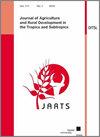Factors driving adoption and constraining the non-adoption of biofortified orange fleshed sweet potatoes (OFSP) among farmers in Abia State, Nigeria
Q3 Social Sciences
Journal of Agriculture and Rural Development in the Tropics and Subtropics
Pub Date : 2020-09-22
DOI:10.17170/KOBRA-202007291509
引用次数: 0
Abstract
This study sought to determine the factors that drive the adoption and constrain the non-adoption of Orange Fleshed Sweet Potato (OFSP) varieties among farmers in Abia State, Nigeria. Multistage sampling procedure was used in selecting sixty sweet potato farmers (thirty adopters and non-adopters each). Participatory tools such as structured interview schedule, key informant interviews and personal observation were employed for quantitative and qualitative data collection. The data were analysed using descriptive statistical tools like, percentage, mean scores and factor analysis. The results of the study revealed that a greater percent of both adopters and non-adopters of OFSP were males. Although the adopters were older than the non-adopters, they were more educated, cosmopolite, cultivated larger farm sizes, earned more income, had more extension contact and access to credit than the non-adopters. The majority of adopters had high knowledge, while non-adopters had moderate knowledge of OFSP. The adopters were motivated to adopt the OFSP mainly as a result of its pleasant taste, profit from the sale of its roots and vines and not necessarily because of its perceived health benefits of supplementing vitamin A. Perceived constraints to the adoption of OFSP by non-adopters were particularly the complexity of OFSP production techniques and the high cost of OFSP vines and roots. Thus, extension agents should create more sensitisation and provide education about OFSP to farmers. Additionally, concerted eorts should be made by the research institutes to provide adequate and easily accessible inputs (vines and other planting materials) so that more farmers can produce vitamin A rich OFSP.尼日利亚阿比亚州农民采用生物强化橙肉甘薯(OFSP)的驱动因素和限制因素
本研究旨在确定尼日利亚阿比亚州农民采用和限制不采用橙花红薯(OFSP)品种的因素。采用多阶段抽样程序选择了60名红薯种植户(各有30名采用者和非采用者)。采用参与式工具,如结构化访谈时间表、关键线人访谈和个人观察,进行定量和定性数据收集。数据使用描述性统计工具进行分析,如百分比、平均得分和因素分析。研究结果显示,OFSP的采用者和非采用者中,男性比例更高。尽管收养者比未收养者年龄大,但他们比未收养的人受教育程度更高,更具世界观,耕种的农场规模更大,收入更高,有更多的推广联系和获得信贷的机会。大多数采用者对OFSP的了解程度较高,而非采用者对其了解程度中等。采用者之所以采用OFSP,主要是因为其味道宜人,从其根和藤蔓的销售中获利,而不一定是因为其补充维生素a对健康的益处。非采用者采用OFSP的明显限制因素尤其是OFSP生产技术的复杂性以及OFSP藤蔓和根的高成本。因此,推广机构应提高对农民的认识,并向他们提供有关OFSP的教育。此外,研究机构应采取协调一致的措施,提供足够且易于获得的投入(葡萄藤和其他种植材料),以便更多的农民能够生产富含维生素A的OFSP。
本文章由计算机程序翻译,如有差异,请以英文原文为准。
求助全文
约1分钟内获得全文
求助全文
来源期刊
CiteScore
2.30
自引率
0.00%
发文量
0
审稿时长
>36 weeks
期刊介绍:
The Journal of Agriculture and Rural Development in the Tropics and Subtropics publishes papers dealing with original research and review papers in the fields of plant production, animal nutrition and animal husbandry, soil science, rural economy and farm management, forestry and forest economy, veterinary hygiene and protection against epidemics.

 求助内容:
求助内容: 应助结果提醒方式:
应助结果提醒方式:


